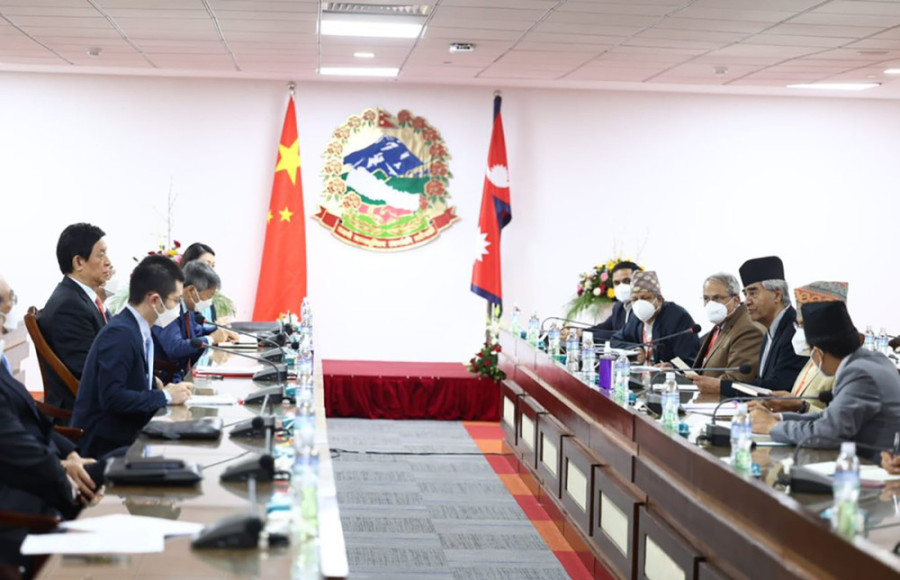Politics
Chinese Speaker inquires about left unity, commits to reopening borders
Li was also keen to know about the status of the MCC Compact and commended Nepal’s stand on the SPP.
Purushottam Poudel
As expected, Li Zhanshu, the Speaker of the Chinese National People’s Congress, enquired about the possibility of a left unity in Nepal during his meetings with top communist leaders on the second day of his Nepal visit on Tuesday.
Whether he also encouraged the left parties to unite or forge a pre-poll alliance is unknown.
“Li seemed eager to learn about the current dynamics among Nepal’s left parties,” a Maoist Centre leader who chose to remain anonymous told the Post.
During his meeting with top communist leaders, Li also discussed the status of the Millennium Challenge Corporation (MCC) compact, which was ratified by Nepal’s Parliament on February 27 despite strong Chinese reservations, as well as the US State Partnership Program (SPP).
Nepal in July had declined to be a part of the SPP after concerns from various quarters that the country should not join any military alliance.
“Besides the possibility of a left unity, the Chinese Speaker also seemed concerned about the MCC,” the Maoist Centre leader said.
Li’s last concern was about the outcome of the general and provincial elections scheduled for November 20, according to leaders.
“The Chinese Speaker’s desire to know more about the MCC and the SPP suggests that China fears that Nepal could join the Western camp,” says foreign policy analyst Shambhu Ram Shimkhada.
“China would prefer to have a strong and united communist front in Nepal, if only to check what it sees as rapid Western advances here,” Shimkhada added. “The Chinese Speaker’s visit is part of the same calculus.”
During his meeting with the Chinese Speaker Li, Maoist Centre chair Pushpa Kamal Dahal reaffirmed Nepal’s commitment to One-China policy. CPN-UML Chairman KP Oli did the same during his earlier meeting with Li on the same day.
Asked by the Post whether Li also raised the issue of left unity with Oli, UML Head of Foreign Affairs Department Rajan Bhattarai replied that party politics were not discussed.
Before Speaker Li came calling, on July 10 Liu Jianchao, the head of the International Liaison Department of the Chinese Communist Party, was in Kathmandu on a four-day visit.
During Liu’s talks back then with both Dahal and Oli, say UML and Maoist Centre insiders, he had repeatedly inquired about the possibility of reviving the left alliance ahead of the general elections.
On June 23 and 24, Liu held video calls with the chairs of the Maoist Centre and the UML.
Coming back to Chinese Speaker Li’s current Nepal visit, during his meeting with UML Chair Oli, “the Chinese leader committed to implementing previous agreements between Nepal and China,” Bhattarai told the Post.
According to him, Li stated China’s desire to expand bilateral ties. “He further wished that Nepal, a free and sovereign nation, would choose its own foreign policy course.”
In his discussion with Chinese leader Li, UML chair Oli reaffirmed Nepal’s commitment “not to allow its territory to be used against China or other friendly nations,” said Bhattarai.
UML Chairman Oli also stressed the importance of implementing agreements under the Belt and Road Initiatives.
The Chinese National People’s Congress Speaker called on Prime Minister Sher Bahadur Deuba on Tuesday evening.
During the meeting, the two dignitaries discussed matters of mutual interest including bilateral trade, investment, connectivity, return of Nepali students to China, resumption of passenger flights, and reopening of border ports, reads a release from the Ministry of Foreign Affairs.
“The Chinese side appreciated Nepal’s stand on One-China policy and its commitment not to allow the Nepali territory to be used against the core interests of China,” reads the statement.
A close aide to Deuba informed that Li, the Chinese delegation head, appreciated Nepal’s principled stand on the SPP during his meeting with Prime Minister Deuba. “Li also seemed pleased with Foreign Minister Narayan Khadka’s China visit at the height of the Taiwan crisis.”
Meanwhile, Li also assured Nepali leaders that China would reopen the long-closed border points shortly after controlling the Covid-19 contagion in Tibet, which they would do before the start of Dashain. Border closure has been causing big problems for the Nepali traders ahead of the festive season.
The Chinese delegation said it would step up efforts to implement Chinese-assisted projects in Nepal. In response to Nepal’s request, the Chinese side agreed to support Nepal’s smooth and sustainable graduation from the LDC status.
Foreign Minister Khadka, during his meeting with Li at Soaltee Hotel on Tuesday evening, reiterated the government’s earlier stand that Nepal would still like China to extend grants to complete the BRI projects and the country was not in a position to accept loans, according to a close aide of Khadka who chose to remain anonymous.
Li also met with Chairman of the National Assembly Ganesh Prasad Timilsina.
According to Timilsina’s secretariat, the Nepali side stressed three key points in the meeting.
“The Nepali side emphasised building bilateral ties and reaffirmed our support for One-China policy. The Nepali delegation asked that the border between the two nations be opened before Dashain.”
The Chinese side, led by Li, is committed to reopening the border, said Timilsina’s secretariat.
The Chinese side also requested that Nepal speed up implementation of Chinese projects, according to the Assembly chair’s office.
Li’s visit comes ahead of the 20th National Congress of the Communist Party of China which is set to confirm President Xi Jinping’s appointment as the party general secretary for a record third time. It also comes only two months before Nepal’s own federal and provincial polls.



 16.12°C Kathmandu
16.12°C Kathmandu















